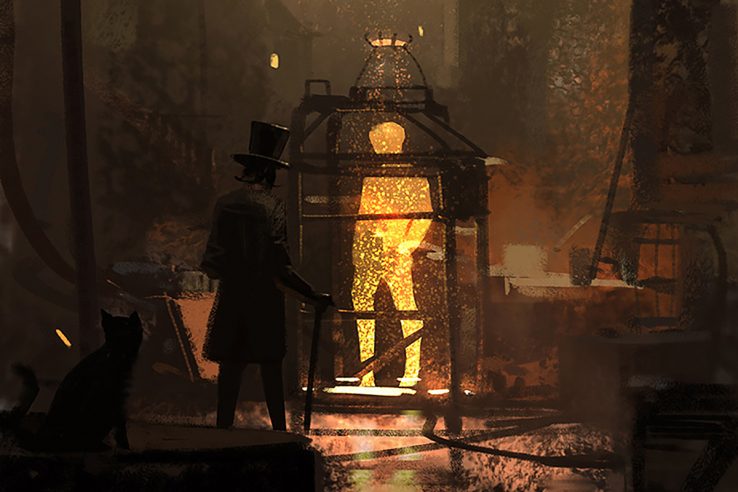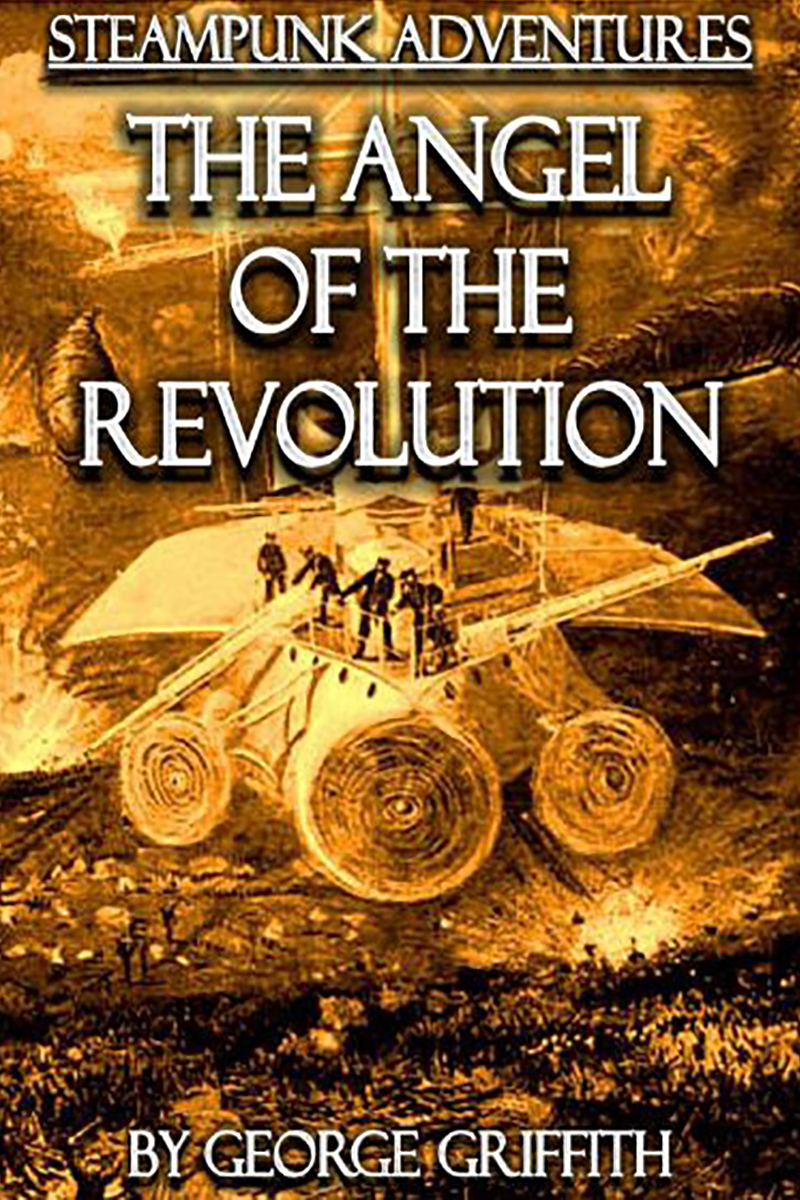
There has been substantial buzz regarding steampunk as a radical political movement recently. The notion has been stated as a fact by some, i.e., radical political ideas are an integral part of steampunk. It was even declared as such in an article featured during the latest Steampunk Week on Tor.com.
I find this most puzzling. I have on a number of occasions made political statements on my blog, I am an active member of a political party, but it does not influence me as a steampunk.
To be more precise, if I had to define a political stance for my version of steampunk, it would be radically different from my real-world views.
Steampunk and real life
I consider steampunk to be an aesthetic and literary movement with very little politics involved. Most people I know who made up a steampunk persona have it set in some version of the past when monarchies still dominate and most have also chosen aristocratic backgrounds for themselves. The same people have similar real world political views to mine, so again, there is a discrepancy between steampunk and real life.
If an individual steampunk uses the subculture to express their political stance (which can be anything from anarchic punk to monarchist), there is nothing to say against it. But to say steampunk is inherently political, which also implies all steampunks have a similar political stance, is simply wrong and an attempt to press the scene into a pidgeon hole.
Where are the steampunk protesters?
There is another thing I find odd in this context and which shows the situation in North America is likely similar to the one in Europe, i.e., steampunk is not political: If steampunk was a radical political movement, I would expect to see people who are obviously steampunk in one or better several videos and photographs of the Occupy Wall Street and related rallies.
I have by now watched quite a few videos from a wide range of sources. To just name the most recognizable ones: CNN, BBC News, Tagesschau (German television), NHK (Japanese Televison), the TYT Youtube Channel. Not a single steampunk in any video.
Thus I did some deliberate research into the matter, but the only form of political activism I could find with a clear relation to steampunk was Anachro Emma Goldman’s address to the protesters at Occupy Wall Street. This form of activism deserves the respect of every steampunk, but it is the sole example.
This does not proof steampunk to be a political movement. It proves the dedication of literally a single individual. Steampunk Emma Goldman has been arrested twice (as of me writing this), this is dedication!
If steampunk was truly a political movement, I would at the very least expect to find steampunks scattered in the crowds. Steampunks stand out, they are visible. I only found the steampunked version of Emma Goldman. No one else. No photo I have seen and no other video relating to the protests has any signs of steampunks in them. The steampunks are not there. Much less any steampunk with a similar degree of dedication. The regular punks are present at the protests, at Wall Street and around the world, and so are a lot of regular people.
I also could not find a single instance of the Occupy Wall Street/Occupy Everywhere being discussed in relation to steampunk let alone what it means to the movement on any of the more popular steampunk blogs. If steampunk was radically political, the steampunk blogosphere should be abuzz discussing the matter.
To claim steampunk is a political movement and then failing to be present at one of the most significant grassroots activist movements of recent history, except for one individual, is appaling. At best, it shows a disconnect from the true heart of the steampunk movement. At worst, it could be interpreted as phony cowardice or an attitude of “I do not need to take action, I am already a steampunk.”
My conclusion
Steampunk is not a political movement, it is about aesthetics and literature with some escapism for flavor. To call it political, or even radical political, is to deny the observable reality of what is happening right now.





4 Comments
Add YoursCould someone please clarify why steampunk has to be political? There seem to be at least three reasons (and plenty I have missed):—
1. “Punk” is part of “steampunk”, ergo, steampunk is political since punk is political (never mind that “steampunk” started out as a joke).
2. An aesthetic allegedly cannot be divorced from the political context of its origin, thus since steampunk aesthetics is based on Victorian aesthetics there is no getting away from Victorian societal evils and everything is ipso facto political (I think e.g. Charles Stross argued something like this in his condemnation of steampunk). I don’t think I buy that argument. And being a stupid computer nerd and philosopher, I can’t figure out why a fantasy world with steam-powered trains, ships, robots, and mechanical computers; zeppelins; forgotten civilisations; and whatnot must suffer from exactly the same society as Victorian Britain or USA; does technology and aesthetics entail society, culture, and politics?
3. Steampunk implies DIY implies radical politics. Huh? I say. I don’t think the first implication is true, and the second most certainly isn’t (unless your definition excludes people who make things simply because they like making things – and everyone else not doing it for radical political reasons).
Steampunk is both literature and aesthetics which either are a part of or visually reference the science fiction of the Industrial Revolution. As science fiction, these stories and ideas explore a ‘what if.’ If this technology or society were different, how would that change the world? Such explorations are, I think, inherently political, but NOT in a “party politics” sense. They are political in that they encourage people to use the fictional future, or the fictional past, to think about today.
So does that make steampunk political? I think so, but NOT in the way that is currently being claimed be eiether the loudest “political” or “apolitical” voices in many of these discussions today.
Many, if not most, of the “founding” stories which modern steampunk hearkens to include critiques of the culture of their day, be it Verne’s 20’000 Lieues Sous La Mer, or Wells’ The Time Machine, or De Mille’s A Strange Manuscript Found In A Copper Cylinder. This would, technically, make them “not conservative.” That said, current North American conservative politics are not conservative either, they are simply “progressive” in a direction differing from the “liberal” position.
So all this to say? Great science fiction, in encouraging readers to think “what if” about the way society works, is political. This would include steampunk. Being political does NOT equate, however, to being a part of the Occupy movement. And being steampunk does not necessitate the same degree or form of political thought or activism in everyone. To assume such is claiming a fallacy. To attempt to drive off or cast out “the other” for not doing so would, in the end, be problematic at best.
[Of note: As many will likely remember, the influx of the “Do It Yourself” and “Maker” end of steampunk swelled in the mid-2000s, leading to a vituperative debate across the internet [including on Brass Goggles’ forum] between loud voices amongst the “Makers” and loud voices amongst those who claimed that only reading literature counts, and art referencing the genre does not.
It got quite heated, and effort was made by some few voices on both sides to claim to “exclude” the other from the community. Everyone suffered for it.]
Coming from a model building background (model boats, planes, railways, and that sort of stuff) with an idea of building something inspired by steampunk literature (and anime, films, etc.), I found the building of stuff suddenly being declared evil rather confusing (and unpleasant); on the other hand, a builder of radio controlled boats inspired by fiction doesn’t necessarily fit into the Maker (capital M) crowd either. Being caught between the warring factions didn’t exactly make steampunk seem more welcoming (but rather something to get the hell out of).